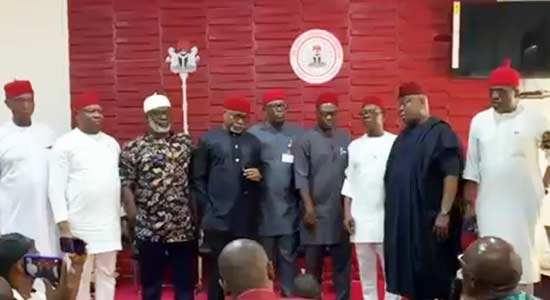Without Nwosu’s Courage “There Would Have Been No June 12”: Southeast Senators Take Recognition Fight To Tinubu After Senate Rejection

Southeast Senators, undeterred by the Senate’s rejection of their motion, have taken their case to President Bola Ahmed Tinubu, passionately lobbying for posthumous recognition of Professor Humphrey Nwosu, the former National Electoral Commission (NEC) chairman who oversaw the historic June 12, 1993 election, arguing his foundational role in Nigeria’s democracy warrants national honor.
In a bold stand following a contentious Senate session, Southeast Senators, led by figures like Enyinnaya Abaribe, have vowed to ensure Professor Humphrey Nwosu’s legacy is recognized, despite the upper chamber’s refusal to endorse their proposals. Speaking at a press conference in Abuja, the senators outlined three key prayers from their failed motion: naming the Independent National Electoral Commission (INEC) headquarters after Nwosu, conferring a posthumous national honor such as the Grand Commander of the Order of Niger (GCON), and observing a minute of silence in his memory—the last of which was the only request granted.
Senator Abaribe emphasized Nwosu’s pivotal role in laying the foundation for Nigeria’s modern electoral system, noting that he initiated the INEC headquarters’ construction before the NEC was dissolved by the military in 1993.
“He was the person who laid the foundations we all enjoy today,” Abaribe declared, recalling how Nwosu’s courage in conducting the 1993 election—widely regarded as Nigeria’s freest and fairest—triggered nationwide unrest after its annulment, ultimately paving the way for the military’s exit in 1999. “If there was no election, there would have been no June 12,” he stressed, linking Nwosu’s actions directly to the democratic milestone now celebrated as Democracy Day.
The senators highlighted Nwosu’s defiance of a court order by Justice Bassey Ikpeme to halt the election, a decision that ensured the poll proceeded. Abaribe recounted how, on June 10, 1993, Nwosu, uninvited, appeared before the National Defense and Security Council to insist the electoral process had begun, convincing then-President Ibrahim Babangida to allow it to continue.
“He announced results for 29 states before being ordered to stop—and even then, he was arrested, yet ensured the process moved forward,” Abaribe said, refuting claims that Nwosu failed to declare the outcome. “The truth is, he did his duty under immense pressure.”
Expressing frustration at the Senate’s rejection, the senators argued that Nwosu’s exclusion from national honors—unlike MKO Abiola, who received a posthumous GCON in 2018—represents an injustice. “Some governments refused to recognize Abiola, but a later one did. June 12 wasn’t recognized until later either. We believe a future government will honor Nwosu if this one doesn’t,” Abaribe asserted, drawing parallels to delayed but eventual recognition of democratic icons.
The senators directed their appeal to President Tinubu, a known June 12 advocate who “participated fully” in the 1993 election as a member of the Social Democratic Party.
“Tinubu is seen as a June 12 warrior. All elements of June 12, including the conduct of that election, deserve recognition,” Abaribe urged, calling on the President to “do the right thing” by immortalizing Nwosu. “He made sure that election held despite obstacles, putting elections in the consciousness of Nigerians. Without his sagacity and courage, it wouldn’t have happened.”
The push aligns with sentiments from figures like former INEC Chairman Attahiru Jega, who, at a colloquium on Tuesday, expressed surprise that Nwosu remains unhonored despite his contributions.
The senators remain resolute, insisting that even a non-binding Senate resolution should not deter the executive from acting. “It may be delayed, but it will not be denied,” Abaribe concluded, hopeful that Tinubu’s administration—or a future one—will rectify this oversight.
Meanwhile, many critics have pointed out a perceived hypocrisy in the resistance to Nwosu’s recognition. “A lot of South West politicians ran under the banner of June 12 and benefitted from it. The people that benefitted from it are arguing against immortalizing the man who stuck out his neck for it,” they argued. Echoing this sentiment, Senator Abaribe added, “It may be delayed, but it will not be denied: Professor Nwosu was the person who laid the foundation that we all enjoy today. Even if this government doesn’t honor Prof. Nwosu, a future government will honor him.” These remarks came during a press conference held by the Southeast Senators after they walked out of the Senate in protest of the rejection of their motion to immortalize Nwosu.





